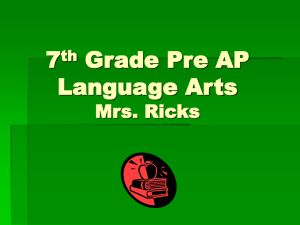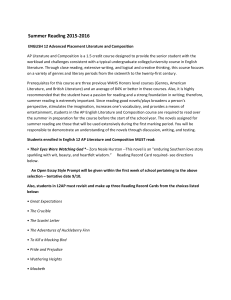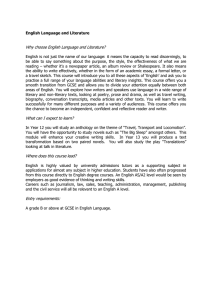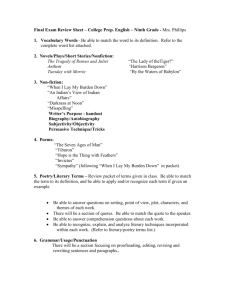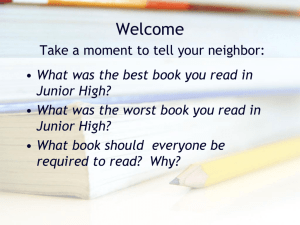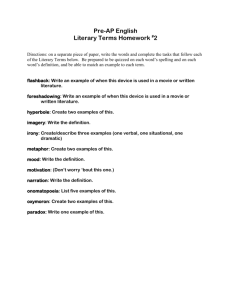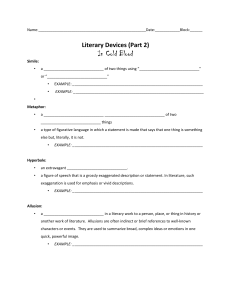Dear PAP Student-Class of 2014, Welcome to Hutto High School
advertisement
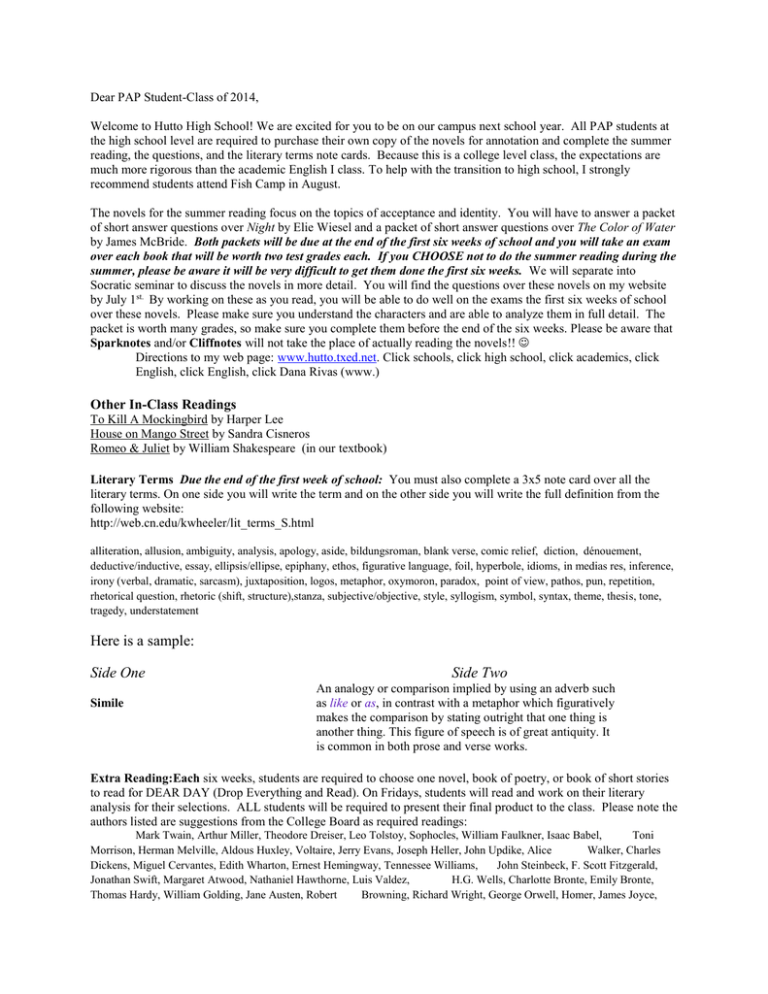
Dear PAP Student-Class of 2014, Welcome to Hutto High School! We are excited for you to be on our campus next school year. All PAP students at the high school level are required to purchase their own copy of the novels for annotation and complete the summer reading, the questions, and the literary terms note cards. Because this is a college level class, the expectations are much more rigorous than the academic English I class. To help with the transition to high school, I strongly recommend students attend Fish Camp in August. The novels for the summer reading focus on the topics of acceptance and identity. You will have to answer a packet of short answer questions over Night by Elie Wiesel and a packet of short answer questions over The Color of Water by James McBride. Both packets will be due at the end of the first six weeks of school and you will take an exam over each book that will be worth two test grades each. If you CHOOSE not to do the summer reading during the summer, please be aware it will be very difficult to get them done the first six weeks. We will separate into Socratic seminar to discuss the novels in more detail. You will find the questions over these novels on my website by July 1st. By working on these as you read, you will be able to do well on the exams the first six weeks of school over these novels. Please make sure you understand the characters and are able to analyze them in full detail. The packet is worth many grades, so make sure you complete them before the end of the six weeks. Please be aware that Sparknotes and/or Cliffnotes will not take the place of actually reading the novels!! Directions to my web page: www.hutto.txed.net. Click schools, click high school, click academics, click English, click English, click Dana Rivas (www.) Other In-Class Readings To Kill A Mockingbird by Harper Lee House on Mango Street by Sandra Cisneros Romeo & Juliet by William Shakespeare (in our textbook) Literary Terms Due the end of the first week of school: You must also complete a 3x5 note card over all the literary terms. On one side you will write the term and on the other side you will write the full definition from the following website: http://web.cn.edu/kwheeler/lit_terms_S.html alliteration, allusion, ambiguity, analysis, apology, aside, bildungsroman, blank verse, comic relief, diction, dénouement, deductive/inductive, essay, ellipsis/ellipse, epiphany, ethos, figurative language, foil, hyperbole, idioms, in medias res, inference, irony (verbal, dramatic, sarcasm), juxtaposition, logos, metaphor, oxymoron, paradox, point of view, pathos, pun, repetition, rhetorical question, rhetoric (shift, structure),stanza, subjective/objective, style, syllogism, symbol, syntax, theme, thesis, tone, tragedy, understatement Here is a sample: Side One Simile Side Two An analogy or comparison implied by using an adverb such as like or as, in contrast with a metaphor which figuratively makes the comparison by stating outright that one thing is another thing. This figure of speech is of great antiquity. It is common in both prose and verse works. Extra Reading:Each six weeks, students are required to choose one novel, book of poetry, or book of short stories to read for DEAR DAY (Drop Everything and Read). On Fridays, students will read and work on their literary analysis for their selections. ALL students will be required to present their final product to the class. Please note the authors listed are suggestions from the College Board as required readings: Mark Twain, Arthur Miller, Theodore Dreiser, Leo Tolstoy, Sophocles, William Faulkner, Isaac Babel, Toni Morrison, Herman Melville, Aldous Huxley, Voltaire, Jerry Evans, Joseph Heller, John Updike, Alice Walker, Charles Dickens, Miguel Cervantes, Edith Wharton, Ernest Hemingway, Tennessee Williams, John Steinbeck, F. Scott Fitzgerald, Jonathan Swift, Margaret Atwood, Nathaniel Hawthorne, Luis Valdez, H.G. Wells, Charlotte Bronte, Emily Bronte, Thomas Hardy, William Golding, Jane Austen, Robert Browning, Richard Wright, George Orwell, Homer, James Joyce, Kurt Vonnegut, Virginia Wolff, Geoffrey Chaucer, Emily Dickinson, Robert Frost, Langston Hughes, Sylvia Plath, Edgar Allan Poe, Sandra Cisneros, Luisa Valenzuela, Chinua Achebe, Vladimir Nabokov, Percy Bysshe Shelley, Amy Tan, Mary Shelley. Grammar Review: The text used is the new Glencoe series the district purchased this year. The school will provide this particular text. Also, the student will be required to have a 3x5 lined note card spiral in which to collect grammar rules. The topics reviewed will be usage of punctuation, sentence fragments and run-ons, subject/verb agreements, various sentence structures, and the correct use of verbs, pronouns, and modifiers. Close Reading: At times we will be reading poetry and literature selections in order to practice our literary skills analysis. These will be completed in class. A non-fiction article (done outside of class) will be completed each 3 weeks applying various research and literary skills. Vocabulary: Every week students will have two new SAT words to add to their speaking and writing language. Students will be required to record all SAT words, tone words, and Pre-AP literary terms in a 4x6 lined note card spiral. The students will be held responsible for the words in the following Pre-AP and AP classes in which more words will be added. Writing: Students will be required to write an essay each six weeks period as a minimum but will have more due with various assignments. The first six weeks will be a review with emphasis placed on prewriting. Essay types: exposition, argumentative, and narrative. Each six weeks starting in January, students will have a timed writing. Having students begin with this concept their freshman year will alleviate apprehension when asked to perform on the AP exam. Topics will be pulled from previous AP exams and will focus on the application of the literary terms/skills we are studying at the time. Since the AP student must be well versed, it is imperative that we do extensive reading. We will be reading novels, short stories, poetry, and non-fiction pieces. About half of the reading must be done outside of class. When this is the case we will make time for a socratic seminar in which to discuss themes, ideas, events, critical thoughts, impressions, and questions covering the novel. The students will be required to complete a dialectical journal which will come in handy during the seminar. All students taking the Pre-AP class will be required to participate in all discussions. Class expectations: Supplies: You are required to keep a three-ring binder for this course. We have a class set of literature books, however you may check one out from me if you need one. These will need to be brought back to me the following day. You will need the following supplies daily: Blue/black pen and pencil Highlighters Packet of Wide Ruled Paper 2" Three-Ring Binder and Composition Book Hand sanitizer and box of tissue per semester Markers (both dry erase and regular) Grades: Although I do not take a grade on every assignment, I will post many daily grades that consist of reading grades (both oral and silent), participation grades, homework grades, and supply checks. These make up 50 % of your grade. Your TEST grades make up the other 50% of your grade. These will be essays, group projects, and vocabulary tests. Absences: If you are absent, you have three days to make up the assignment before it becomes a zero. Please check the agenda on the board daily to see what we are doing in class. I strongly suggest you keep a planner for my class. Sometimes I check these for bonus points on assignments. I also keep assignments updated on the calendar link on my website. Your first assignment is to send me an email introducing yourself with your first and last name, parent(s)’ names with their email and phone numbers to dana.rivas@hutto.txed.net . Your second assignment is to bring this form back signed by your parent. Parents, if you have any questions or concerns, please feel free to contact me through email or telephone, or schedule a conference. I look forward to a very exciting year with each of you! Sincerely, Mrs. Rivas PAP English I Student Signature _____________________________ Parent Signature _____________________________
